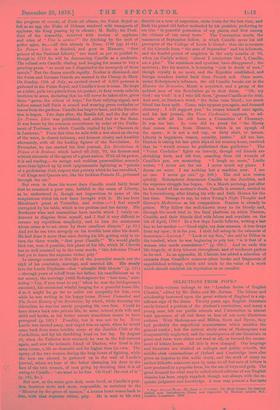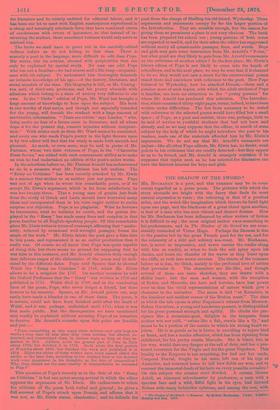SELECTIONS FROM POPE.*
This little volume belongs to the "London Series of English Classics," edited by Mr. Hales and Mr. Jerram. The labour and scholarship bestowed upon the great writers of England is a sig- nificant sign of the times. Twenty years ago, English literature rarely formed a portion of the student's curriculum, and many a young man left our public schools and Universities in almost total ignorance of all but three or four of our most illustrious authors. With Shakespeare and Milton, Scott and Byron, they had probably the superficial acquaintance which satisfies the general reader ; but the critical study even of Shakespeare was comparatively neglected, and the masterpieces of our literature in prose and verse were either not read at all, or formed the amuse- ment of leisure hours. All this is now changed. Our language and literature are studied at colleges and public schools, the middle-class examinations of Oxford and Cambridge have also given an impetus to this noble study, and the work of many an author hitherto unknown save by name to all but men of letters is now produced in a popular form, for the use of boys and girls. The great demand for what may be called school editions of our English classics has been amply supplied, though not always with the re- quisite judgment and knowledge. A man may possess a fine taste * Pope: Selected Pains; The Essay on Cr titian!: The Moral Essays: Tht Denied. Edited, with Introduction, Notes, and Appendix, by Thomas Arnold, M.A. London: Longman. 1876.
for literature and be utterly unfitted for editorial labour, and it bas been our lot to meet with English masterpieces reproduced in -s. cheap and seemingly scholastic form that have combined errors of carelessness with errors of ignorance, so that instead of in- structing the student, these annotated volumes would only serve to mislead him.
The faults we shall have to point out in the carefully-edited volume before us do not belong to this class. There is scarcely a poet in the language more difficult to edit than Pope. His works, like his actions, abound with perplexities that can -only be explained by special study. No man can edit Pope who has not a familiar—we had almost said a life-long—acquaint- ance with his subject. To understand him thoroughly demands an intimate knowledge of his age,—of the history, literature, and social scandals of the time. His biography is full, as Mr. Coning- ton said, of third-rate problems, and his poetry abounds with allusions which belong to a state of society very different to our own. In the " Globe " edition of Pope, Mr. Ward has brought a large amount of knowledge to bear upon the subject. His book is one worthy of that series, and though not especially intended for the young, will furnish the student with a large amount of serviceable information. " There are critics," says Landor, " who, lying under no fear of a future state in literature, and all whose hope is for the present day, commit injustice without compunc- tion." With critics such as these Mr. Ward cannot be numbered, and every one who reads Pope's poetry in the light thrown upon it by this editor will find that his study is made both smooth and pleasant. As much, or even more, may be said in praise of Mr. Pattison, whose two little volumes of Pope, in the " Clarendon Press Series," are edited with such consummate ability as to make es wish he had undertaken an edition of the poet's entire works.
In the selections before us, Mr. Thomas Arnold has endeavoured to do in a measure what Mr. Pattison has left undone. The 46 Essay on Criticism " has been recently attacked by Mr. Elwin in a manner that strikes us as neither just nor generous. Pope was not of age when he wrote this remarkable poem, or if we accept Mr. Elwin's argument, which is far from satisfactory, he was but twenty-three. That a young man of genius just fresh 'from the study of Greek and Latin should have borrowed many ideas and incorporated them in his verse ought neither to excite surprise nor objection. Pope is no plagiarist. What he borrows he transmutes, what he imitates be excels, and the genius dis-
played in the " Essay" has made many lines and couplets in that poem familiar to all English-speaking people. Of this remarkable piece Mr. Elwin writes in terms of contempt, affirming that "medio- crity, relieved by occasional well-wrought passages, forms the staple of the work." Mr. Elwin thinks the poet gave a false date to this poem, and represented it as an earlier production than it really was. Of course we all know that Pope was quite capable of doing this, but there seems no ground for supposing that he was false in this instance, and Mr. Arnold observes truly enough that different stages of the elaboration of the poem may be indi- cated by the different dates. Pope told Spence that he showed Walsh the "Essay on Criticism" in 1706, which Mr. Elwin allows to be a misprint for 1707. On another occasion he told the Oxford Professsor that the " Essay " was written in 1709 and published in 1711. Walsh died in 1708, and in the concluding lines of the poem, Pope, who never forgot a friend, his done honour to his memory. Spence, as Mr. Arnold points out, may easily have made a blander in one of these dates. The poem, it is certain, could not have been finished until after the death of Walsh, and it was, perhaps, unfinished until 1711, when it was first made public. But the discrepancies we have mentioned may readily be explained without accusing Pope of an intention to deceive. Mr. Arnold's remarks upon this point are forcible and just:-
"Pope—resembling in this many other writers—not only kept his works a long time by him after they were written, but altered, re- touched, and transformed them in various ways, so long as they re- mained in KS. Addison wrote the greater part of Cato in Italy about 1706, but finished it in 1713. Scott wrote the first portion ,of Waverley about 1805, but finished the work and published it in 1814. Might not either of these writers have truly named either the earlier or the later date, according as the original draft or the finished work were uppermost in his thoughts, as the date of composition ? "Why, then, should not the same charity of interpretation be extended 4o Pope?"
This question of Pope's veracity as to the date of the " Essay on Criticism " is but one point among several in which the editor opposes the arguments of Mr. Elwin. He endeavours to refute his criticism of the poem both verbal and general ; he gives a full account of. Pope's attack upon Dennis, and affirms that it was not, as Mr. Elwin states, clandestine ; and he defends the poet from the charge of libelling his old friend, Wycherley. These arguments and statements occupy by far the larger 'portion of the Introduction. They are sensible enough, but 'the reason for giving them so prominent a place is not very obvious. The book has been prepared for school use ; young persons of both sexes are expected to read it, and for their sakes the editor has suppressed without mercy all questionable passages, lines, and words. Boys and girls may gain some instruction from Mr. Arnold's "Notes," but what good are they likely to gain from Mr. Arnold's comments on the criticisms of another editor? In the first place, Mr. Elwin's library editon of Pope is not likely to come into the hands of schoolboys, andin the next place, we may be sure that if it chanced to do so, they would not care a straw for the controversial points raised there and elsewhere with reference to the poet. How Pope behaved to Wycherley, how he attacked Dennis,—these and a number more of such topics, with which the adult student of Pope is familiar, can have no attraction to the " young persons" for whom Mr. Arnold has produced this selection. The Introduc- tion ,which consists of thirty-eight pages, seems, indeed, to have been written under difficulties. The few facts necessary to be stated with reference to the selected poems would have filled but a small space ; of Pope, as a poet and satirist, there was, perhaps, little to be said of service to youthful students that had not been said already, and so we may suppose that the editor, in search of some subject by the help of which he might introduce the poet to his readers, made use of the materials afforded him by Mr. Elwin's arguments. We do not say that Mr. .Arnold's comments are unjust—like all other Pope editors, Mr. Elwin has, no doubt, weak points in his criticisms that are readily detected—but they appear to us to be forced, and Mr. Arnold is strangely mistaken if he supposes that topics such as he has selected for discussion can have the faintest interest for boys and girls.



































 Previous page
Previous page